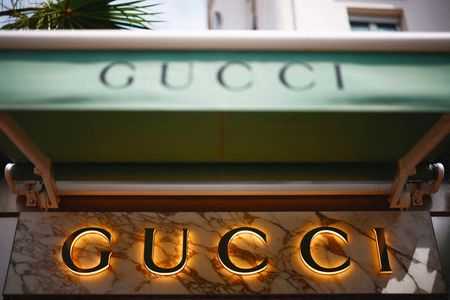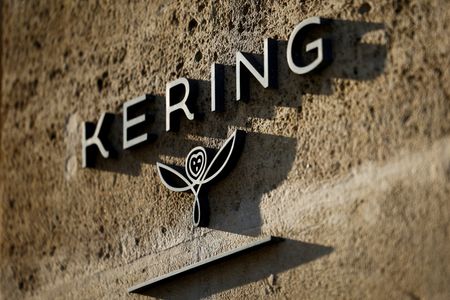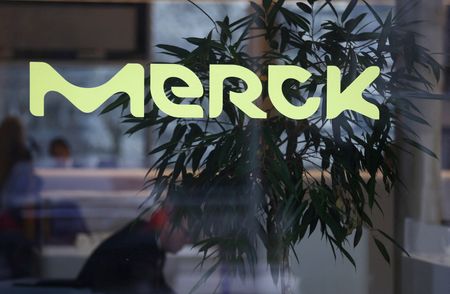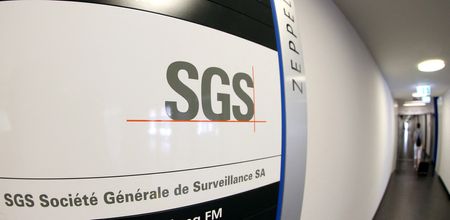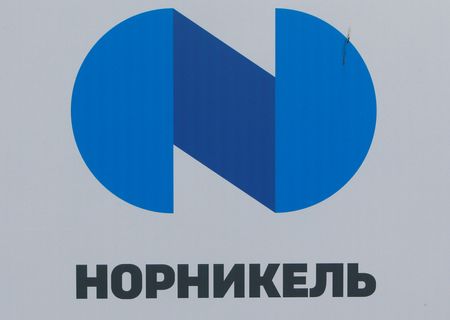By Mimosa Spencer and Tassilo Hummel
PARIS (Reuters) -Luxury group Kering’s fourth quarter sales were hit by a continued slump at its main brand Gucci, it said on Tuesday, prompting caution among analysts over its recovery prospects despite some improvement that initially buoyed investors.
Shares in the French group jumped 5% in early trade as the market seized on hopes the company had reached an inflection point touted by CEO Francois-Henri Pinault.
They later eroded gains, and were flat by 1150 GMT.
Kering’s sales fell 12% in October-December on a comparable basis from a year earlier, dragged down by a 24% drop at Gucci, which continues to struggle.
Sales at the group’s smaller labels, particularly the upmarket Bottega Veneta, did better than expected, however.
“These results should reassure investors that trends are modestly improving against low sentiment and favourable positioning,” analysts at RBC said in a note.
Pinault, in a statement, said the group has reached a “point of stabilization, from which we will gradually resume growth”.
“Gucci will come back. I have absolutely no doubts about this,” Pinault told analysts on a call.
In his first major move since becoming Gucci CEO in January, Stefano Cantino sacked Gucci designer Sabato de Sarno last week as part of efforts to revive the label, which accounts for nearly half of group sales and about two thirds of recurring operating profit.
“With the new CEO apparently willing to make bold changes, including changing creative director, we believe the worst may be behind us, although the timing for a potential reset remains unclear at this stage,” added the RBC note.
Gucci’s fourth-quarter sales slump showed its aesthetic overhaul is still struggling to win new business. Analysts had not expected a rebound until next year but have said the recruitment of a new designer could slow progress.
Pinault said the design change would not slow the brand’s turnaround, while deputy CEO Francesca Bellettini said a new designer would be announced promptly, “sooner rather than later”.
Kering’s efforts to turn around Gucci with a new, minimalist design approach from De Sarno, who took up the position two years ago, were complicated by a global slump in luxury demand.
The industry’s sales rate is the slowest in years, and consultancy Bain & Company estimated luxury sales fell 2% globally last year, weighed down by a property crisis in China – a major market for Gucci.
Finance chief Armelle Poulou told reporters that Kering’s sales in mainland China and among Chinese shoppers globally rose by a combined 6 percentage points compared with the third quarter, while U.S. sales also increased.
Previously one of the industry’s biggest success stories, with soaring growth in the 2016-2020 period, fuelled by baroque, gender-fluid designs from Alessandro Michele, Gucci fell behind when shoppers’ tastes shifted.
Rivals, including LVMH-owned Louis Vuitton and Dior, meanwhile, successfully tapped into the strong, post-pandemic surge in demand for fashion.
Full year recurring income from group operations came to 2.6 billion euros, slightly higher than Kering guidance in October for 2.5 billion euros.
Kering’s 12-month price-to-earnings ratio, based on projected earnings, is 19, behind LVMH at 24 and Moncler at 25, as well as Burberry, which is currently undergoing a revamp under new management and has shot up to reach 60, LSEG data shows.
($1 = 0.9705 euros)
(Reporting by Mimosa Spencer and Tassilo Hummel; Editing by Dominique Patton and Susan Fenton)

